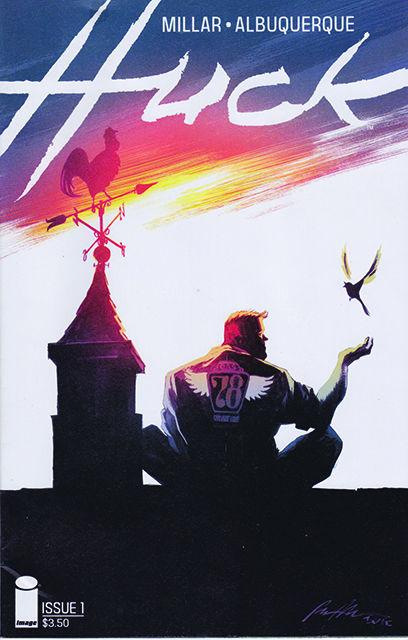 Source: Image Comics
Source: Image Comics
On Nov. 18, Image Comics published the first issue of the new comic book series “Huck” written by Mark Millar and illustrated by Rafael Albuquerque. The book follows the story of its titular protagonist a selfless individual with superhuman strength and an unspecified mental disability who helps his small Midwestern town.
" />Source: Image Comics
Source: Image Comics
On Nov. 18, Image Comics published the first issue of the new comic book series “Huck” written by Mark Millar and illustrated by Rafael Albuquerque. The book follows the story of its titular protagonist a selfless individual with superhuman strength and an unspecified mental disability who helps his small Midwestern town.
4.5 out of 5 stars
Next March, Batman and Superman will battle it out on the big screen in “Batman V Superman: Dawn of Justice”; while Earth’s Mightiest Heroes will do the same in “Captain America: Civil War” a couple months later. In the comics, both DC and Marvel have recently featured apocalyptic alternate universes with storylines like “Forever Evil” and “Secret Wars” respectively. With so much cynicism in the modern age of superheroes, it might seem difficult to find a more uplifting story in this genre.
This is what makes “Huck,” a new series from Image Comics, so unique. Not only is this character a Spielberg-like antithesis to a long list of darker heroes, but it ironically springs from the mind of writer Mark Millar, the same creator of such outrageously violent works as “Kick-Ass,” “The Secret Service” and Marvel’s “Civil War” series.
The comic follows the story of its titular protagonist, an all around selfless individual with superhuman strength who resides in a small Midwestern town. Huck also has an unspecified mental disability, which has understandably led many readers to compare the comic to “Forrest Gump.” Indeed, both characters have a lot in common. Rather than seek recognition as an international superhero, Huck is content with helping the people in his community by doing things like retrieving lost items, clearing out a space for his neighbor’s barn and taking out the trash for the entire town.
Nevertheless, Huck doesn’t hesitate to respond to tragedies around the globe that he sees on the evening news. His only condition is that the people he helps keep his identity a secret. That said, you can kind of guess what happens at the end of the first issue.
Though “Huck” lacks the shock-value and twists found in many of Millar’s other works, its predictability doesn’t hinder readers from simply enjoying it. Similar to “E.T.” and “Close Encounters of the Third Kind,” the book revels in its humanistic storytelling. It seems that in recent years, Millar has drifted away from his darker material to write love letters to the more light-hearted, escapist stories from his childhood. In 2013, he and artist Goran Parlov delivered the Image miniseries “Starlight,” a delightfully entertaining throwback to sci-fi pulps like Flash Gordon and Buck Rogers.
While Millar’s characters and story lay the foundation for “Huck,” it’s the work of artist Rafael Albuquerque that really draws readers in. Known for his work on the popular horror comic “American Vampire,” Albuquerque delivers an equally cinematic and fluid style here.
In the opening scene, which features the hero diving deep underwater just to retrieve a golden chain for someone, each and every panel is layered with gorgeous visuals that leave readers mesmerized. And given that Millar is a favorite among Hollywood producers and has already sold the film rights to this comic book, the art here practically serves as a storyboard for whatever director will eventually helm this project (I’m crossing my fingers for either Spielberg or J.J. Abrams).
Millar recently announced on his Facebook page that this series will run for 24 issues, which makes it easily accessible for any number of readers. Even if you’ve never picked up a comic book in your life, give it a shot. In a world where mass shootings and terrorist attacks seem to happen on a weekly basis, “Huck” delivers a hopeful spirit that is too often lacking in pop-culture.